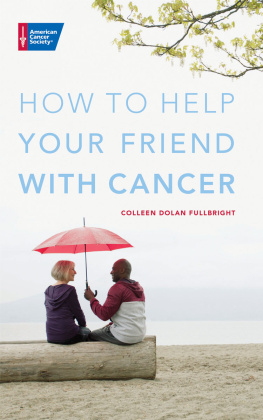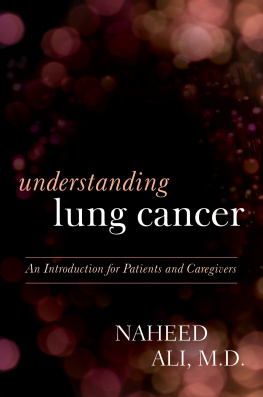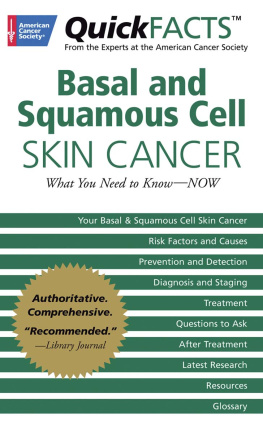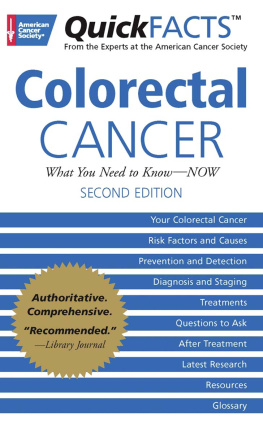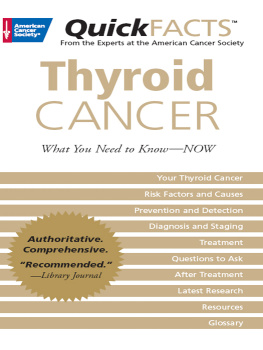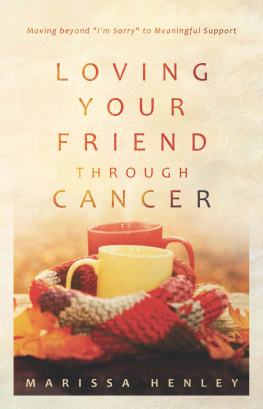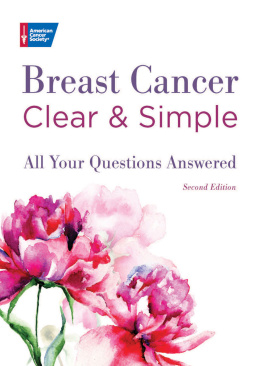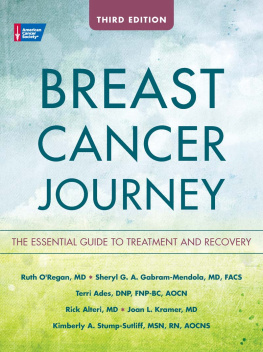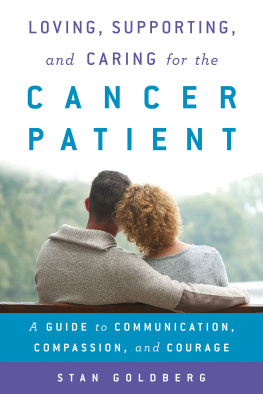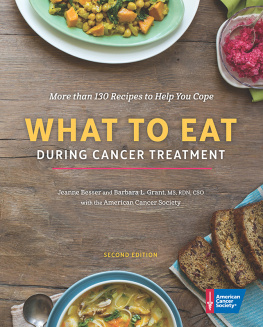
Published by the American Cancer Society/Health Promotion
250 Williams Street NW
Atlanta, Georgia 30303-1002 USA
Copyright 2015 American Cancer Society
Originally published in 2005 as Cancer: How Friends Can Help (ISBN 0-9767110-0-1), Colleen Fullbright. The material has been revised and updated for this edition.
All rights reserved. Without limiting the rights under copyright reserved above, no part of this publication may be reproduced, stored in or introduced into a retrieval system, or transmitted in any form or by any means (electronic, mechanical, photocopying, recording, or otherwise) without the prior written permission of the publisher.
Printed in the United States of America
Cover design and composition: Rikki Campbell Ogden/pixiedesign llc
Index: Bob Land
5 4 3 2 1 15 16 17 18 19
Library of Congress Cataloging-in-Publication Data
Fullbright, Colleen Dolan.
[Cancer]
How to help your friend with cancer / by Colleen Dolan Fullbright.
pages cm
Revision of: Cancer. 2005.
Includes bibliographical references and index.
ISBN 978-1-60443-224-4 (paperback) ISBN 1-60443-224-1 (paperback) 1. CancerPsychological aspects. 2. Helping behavior. I. Title.
RC262.F86 2014
616.994dc23
2014030700
AMERICAN CANCER SOCIETY
Managing Director, Content: Chuck Westbrook
Director, Book Publishing: Len Boswell
Managing Editor, Book Publishing: Rebecca Teaff, MA
Senior Editor, Book Publishing: Jill Russell
Coordinator, Book Publishing: Vanika Jordan, MSPub
Editorial Assistant, Book Publishing: Amy Rovere
For more information about cancer, contact your American Cancer Society at 800-227-2345 or cancer.org.
Quantity discounts on bulk purchases of this book are available. For information, please contact the American Cancer Society, Health Promotion Publishing, 250 Williams Street NW, Atlanta, GA 30303-1002, or send an e-mail to .
FOR ALL WHO BROUGHT
LEVITY AND LIGHT TO
MY CANCER EXPERIENCE
CONTENTS

CHAPTER 1
Diagnosis
CHAPTER 2
During Treatment
CHAPTER 3
Supporting the Family and Caregiver
CHAPTER 4
After Treatment Ends
CHAPTER 5
If a Cure Is No Longer Possible
PREFACE

My breast cancer was diagnosed in the fall of 2000. I went through surgery, six months of chemotherapy, and six weeks of radiation therapy. In retrospect, my cancer experience turned out very well. I was fortunate. I had very good medical insurance. I had an excellent oncology team located in the city where I live and was spared long drives for treatment. I was in an ongoing support group for women with breast cancer, and I became close to other members with whom Im still in contact. My family lived close by and was wonderful.
And I had loyal friends, too. Heres one of my favorite memories: I was newly bald and not at all fond of the wig Id purchased. My friend took me out to lunch one day and suggested that we stop by Macys afterward. She wanted to help me find a hat, she said. I stood in the dressing room while she gathered hats for me to try on. I tried on all sortswhatever she brought inhigh fashion, plain, sophisticated, off-the-wall. She tried on a few herself. We giggled a lot. I arrived home with three hats and that warm, splendid feeling one has when youve been the recipient of anothers thoughtfulness. Kindness works wonders.
Few generalities can be made about the cancer experience, except thatfor most peopleit is the scariest time of their lives. It might be the loneliest time, too. Everyone who has cancer needs help from others: practical assistance, emotional support, kind words, and loving gestures.
This book is a compilation of suggestions for how you can provide that help. Whether you have a friend, neighbor, or coworker who is facing cancer, there are ways you can assist her and her loved ones.
I used a variety of sources in the course of my research. Primarily, I talked with other people with cancer and their friends, families, and caregivers about the kinds of help and comfort they found most beneficial. I also contacted researchers and talked with oncology professionals. And I did a lot of readingbooks and articles, websites and blogs. Some of the books were academic, and some were not. The websites and blogs were of a diverse mixtureinformation from cancer organizations or opinion pieces by well-known authors or sites that offered a glimpse into the lives of those dealing with cancer. I sat in on support groups, as well. I found that these visits provided some helpful suggestions from members and affirmed much of what I ran across in the literature: That fatigue is the most common complaint throughout the cancer experience. That people whove had cancer live with the fear of recurrence no matter how long its been since their treatment. That avoidance by friends is hurtful and difficult to understand.
Many people graciously contributed to this book, some in huge ways. I would like to thank Jennifer Alexander, Amy Wings Support Group, Nina Bjornsson, John Calderazzo, Marsha Callegari, Peter Callegari, Nancy Campbell, SueEllen Campbell, Pattie Cowell, Brock Dethier, Jim Fullbright, John-Paul Gomez, Melody Graulich, Jeanice Hansen, Luana Heikes, Leonor Kennell, Jean Lamm, Jana Bolduan Lomax, Ann Magennis, Susan Mann, Linda Miller, Sherry Pomering, Dan Robinson, and my dear friend, recording artist Dogwood Daughter. I am deeply indebted to the following people from the American Cancer Society: Jill Russell, my editor, for her gentle guidance and expertisea joy to work with. Rebecca Teaff and Amy Rovere, for their valuable editorial support. Vanika Jordan, for her many vital contributions as production coordinator. And finally, Len Boswell, director of publishing, to whom I owe a hearty and heartfelt thank you.
There will always be one more idea that was not included in this book. It is my great hope, however, that this book will serve you well as a starting point. Helping one another is such a vital part of human nature.
Colleen Dolan Fullbright
INTRODUCTION

A friend calls to tell you that she has received a diagnosis of ovarian cancer. You can hear the shock and devastation in her voice, and you want to provide some comfort. You have never been at a loss for words, but suddenly, you dont know what to say.
A longtime neighbor recently had surgery for thyroid cancer and will soon begin daily radiation treatments. She is a single mother with an unreliable car. You want to help her but dont have a lot of time. What do you do?
You hear that a friend and longtime coworker has just learned he has colon cancer. Youre not sure what to say or do for him. And because he has a large group of friends, you wonder whether he really needs your help.
Shock. Indecision. Helplessness. Fear. When you first learn that a friend has cancer, you might feel some of the same emotions she is experiencingshock, fear, helplessness. These feelings can make it all the more difficult to know what to do. You may even think about avoiding your friend altogether because of your own discomfort and fear.
Avoidance is not a good idea: she needs you. Though many factors will figure in her recovery, support from friends and family will be crucialfrom diagnosis through treatment and into life after treatment. Help and encouragement from family and friends can benefit a person going through cancer in countless ways. Friends can reframe the situation so it feels less overwhelming and threatening. They can lessen their friends stress by providing emotional support or offering concrete help, such as lending a hand with chores or childcare. Friends can be a welcome distraction and, above all, remind the person that she is valued, loved, and not alone.
Next page
